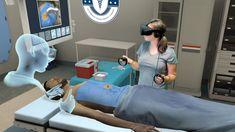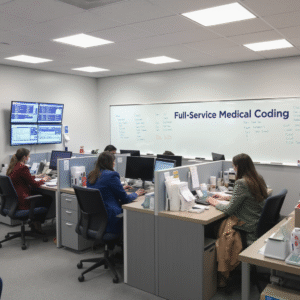Cardiology Coding Services: From Cath
Labs to E/M
Cardiology Coding

Cardiology Coding
Cardiology Coding
Cardiology Coding is one of the most complex and critical specialties in modern medicine. Every day, millions of people receive specialized care for cardiovascular diseases, which remain the leading cause of death in many parts of the world. But behind every electrocardiogram, coronary intervention, or clinical visit, there is a structured medical coding system that ensures proper billing, documentation, and analysis of each procedure. This is the essence of cardiology coding services.
Accurate coding not only facilitates reimbursement from insurers, but also enables healthcare organizations to improve their internal processes, comply with regulatory requirements, and provide better patient care. From complex cath lab procedures to clinical consultations requiring detailed medical judgment, coding acts as an invisible but vital bridge between care and administration.
What is cardiology coding?
Cardiology coding is the process of translating cardiac-related procedures, diagnoses, and medical services into standard codes such as ICD-10, CPT, and HCPCS. These codes allow for clear and consistent communication of what was done, why it was done, and how each service is clinically justified. This information is essential for:
- Accurate and efficient billing to insurers.
- Regulatory compliance with entities such as Medicare and Medicaid.
- Clinical and administrative statistics.
- Quality analysis and continuous improvement.
The heart of the hospital: Cath Labs

Cardiac catheterization laboratories (Cath Labs) are specialized centers where advanced procedures such as stenting, angioplasty, and hemodynamic studies are performed. Accurate coding of these procedures is critical, as they often involve multiple steps and expensive devices.
Common procedures:
- Coronary Angiography (CPT 93454 – 93461)
- Percutaneous Coronary Interventions (PCI) (CPT 92920 – 92944)
- Right/Left Heart Catheterization
- Intravascular Ultrasound (IVUS) y Fractional Flow Reserve (FFR)
- Pacemaker implants, defibrillators and biventricular devices
Challenges in Cath Lab coding
One of the biggest challenges is correctly documenting and coding procedures that can change in real time, depending on the patient’s condition. For example, a diagnostic procedure can turn into an unplanned therapeutic intervention during the same session. Coders must correctly interpret the medical narrative, differentiate between combined services, and appropriately use modifiers such as -59 or -26.
Evaluation and Management (E/M) in Cardiology

Beyond technical procedures, cardiologists perform detailed clinical evaluations that include symptom interpretation, medication adjustment, and complex clinical decisions. These services are recorded using E/M codes, which reflect the complexity of clinical thinking more than physical procedures.
E/M Service Levels:
- New patients (99202–99205)
- Established patients (99211–99215)
- Initial and follow-up hospital visits (99221–99233)
- Consultation Services (99242–99245)
- Intensive and critical care (99291–99292)
Recent changes:
Since 2021, E/M coding guidelines have focused on the complexity of medical decision making (MDM) and total care time. This reform allows physicians to more accurately document the cognitive effort required, reducing unnecessary testing bureaucracy.
Importance of specialized coders
Having specialized cardiology coders is not a luxury, but a necessity. Their specific experience allows them to properly interpret medical documentation and apply current regulations, avoiding costly errors. Furthermore, these experts can provide training to medical staff to improve the quality of documentation from the outset.
Miscoding not only affects revenue, but can also trigger audits, penalties, and loss of institutional reputation. A single error can have significant financial consequences, especially in high-cost procedures.
The Importance of Specialized Coders in Modern Software Development
In today’s rapidly evolving technological landscape, the demand for specialized coders has reached unprecedented levels. As software systems become increasingly complex and industries require more sophisticated digital solutions, the role of developers with deep expertise in specific domains has become crucial for organizational success and innovation.
The Evolution of Programming Specialization
The early days of programming were characterized by generalist developers who could handle multiple aspects of software development. However, as technology has advanced and business requirements have become more nuanced, the field has naturally evolved toward specialization. Modern software development encompasses numerous disciplines, from front-end user interface design to back-end system architecture, from mobile application development to artificial intelligence implementation.
This evolution mirrors what we see in other professional fields. Just as medicine has evolved from general practitioners to highly specialized surgeons, cardiologists, and neurologists, software development has branched into distinct specializations that require years of focused learning and experience to master effectively.
Key Areas of Coding Specialization
Specialized coders typically focus on specific technology stacks, programming languages, or industry verticals. Front-end specialists master frameworks like React, Angular, or Vue.js, becoming experts in creating intuitive user experiences and responsive designs. Back-end developers specialize in server-side technologies, database management, and system architecture using languages like Python, Java, or Node.js.
Data scientists and machine learning engineers represent another critical specialization, combining programming skills with statistical analysis and domain knowledge to extract insights from complex datasets. DevOps engineers focus on deployment, automation, and infrastructure management, bridging the gap between development and operations teams.
Security specialists have become increasingly valuable as cyber threats continue to evolve. These professionals possess deep knowledge of encryption, vulnerability assessment, and secure coding practices that are essential for protecting sensitive data and maintaining system integrity.

Enhanced Problem-Solving Capabilities
Specialized coders bring unprecedented depth to problem-solving within their domains. Their focused expertise allows them to identify optimal solutions that generalist developers might overlook. A database specialist, for instance, can optimize query performance and design efficient data structures that significantly improve application speed and scalability.
This deep knowledge extends beyond technical implementation to understanding industry-specific challenges and requirements. A healthcare software specialist understands HIPAA compliance requirements and patient data security protocols, while a financial technology expert is versed in regulatory compliance and fraud prevention measures.
Quality and Efficiency Advantages
Organizations that employ specialized coders typically see marked improvements in code quality and development efficiency. Specialists write more maintainable, scalable, and robust code within their areas of expertise. Their familiarity with best practices, common pitfalls, and advanced techniques in their specialization leads to fewer bugs and more elegant solutions.
The efficiency gains extend to project timelines as well. Specialized developers can implement complex features more quickly because they possess the necessary knowledge and experience. They know which tools to use, which approaches work best, and how to avoid common mistakes that could derail development schedules.
Innovation and Competitive Advantage
Specialized coders serve as innovation catalysts within organizations. Their deep understanding of emerging technologies and industry trends enables them to identify opportunities for technological advancement and competitive differentiation. They can evaluate new frameworks, libraries, and methodologies with the expertise needed to make informed adoption decisions.
Companies with strong specialized talent are better positioned to leverage cutting-edge technologies like artificial intelligence, blockchain, or augmented reality. These specialists can navigate the complexities of implementing advanced solutions while avoiding the pitfalls that often accompany bleeding-edge technology adoption.
Meeting Complex Industry Requirements
Modern industries have developed sophisticated requirements that demand specialized knowledge. Healthcare applications must comply with strict regulatory standards while handling sensitive patient data. Financial systems require real-time processing capabilities with zero tolerance for errors. Gaming applications need to handle massive concurrent user loads while delivering seamless experiences.
Specialized coders understand these industry-specific requirements and can design systems that meet them effectively. Their expertise ensures that applications not only function correctly but also comply with relevant regulations and industry standards.
The Collaboration Factor
While specialization is crucial, the most successful development teams combine specialists with strong collaboration skills. Cross-functional teams that include specialists from different domains can tackle complex projects that require expertise across multiple areas. A successful mobile application, for example, might require collaboration between UI/UX specialists, mobile developers, back-end engineers, and security experts.
Specialized coders who can communicate effectively with other team members and understand how their work integrates with other system components are particularly valuable. They serve as domain experts while contributing to the overall architectural vision of complex software systems.
Future-Proofing Organizations
Investment in specialized coding talent represents a strategic approach to future-proofing organizations against technological disruption. As new technologies emerge and existing ones evolve, having specialists who can quickly adapt and implement changes becomes a significant competitive advantage.
The rapid pace of technological change means that organizations need team members who can stay current with developments in their specialized areas while contributing to strategic technology decisions. These specialists serve as internal consultants who can guide technology adoption and implementation strategies.
In conclusion, specialized coders have become indispensable assets in modern software development. Their deep expertise, enhanced problem-solving capabilities, and ability to drive innovation make them crucial for organizations seeking to leverage technology effectively. As software systems continue to grow in complexity and industries develop more sophisticated requirements, the importance of specialized coding talent will only continue to increase, making investment in these professionals a strategic imperative for forward-thinking organizations.
Real cases of impact
A 400-bed hospital faced monthly losses due to misuse of modifiers in Cath Lab procedures. After implementing specialized external coding, admissions increased by 23% and appeals decreased by 70%.
Private cardiology clinic: Had a 15% rejection rate on E/M claims. After undergoing auditing and training, the rate dropped to 3% in just two months.
Good practices
- Establish clear protocols for medical documentation.
- Train staff on the importance of clinical accuracy.
- Regular internal coding audits.
- Active collaboration between physicians and coders.
- Adoption of technological tools with artificial intelligence.
Future trends

- AI-powered predictive coding: Algorithms that suggest codes in real time based on clinical notes.
- Full EMR integration: Platforms that unify coding, documentation, and billing into a single system.
- Value-based models: incentives that reward results rather than volume of procedures.
How to Choose an Encoding Provider
| Criterion | Importance |
|---|---|
| Specialization | Improves accuracy |
| Certification (AAPC/AHIMA) | Quality assurance |
| Bilingual support | Ideal for diverse patients |
| HIPAA Security | Protect patient data |
| Continuous monitoring | Optimize results |
Conclusion
Medical coding in cardiology is an essential component that connects clinical excellence with administrative efficiency. Whether in the highly technical environments of catheterization laboratories or in the detailed clinical evaluation of E/M services, each code reflects a decision, an action, and an impact on a patient’s life.

Investing in professional coding services isn’t just a way to avoid errors: it’s a strategy to improve organizational performance, ensure regulatory compliance, and guarantee patient-centered care. In a constantly evolving environment, cardiology coding is more than an operational necessity; it’s a powerful tool for transformation and growth.



